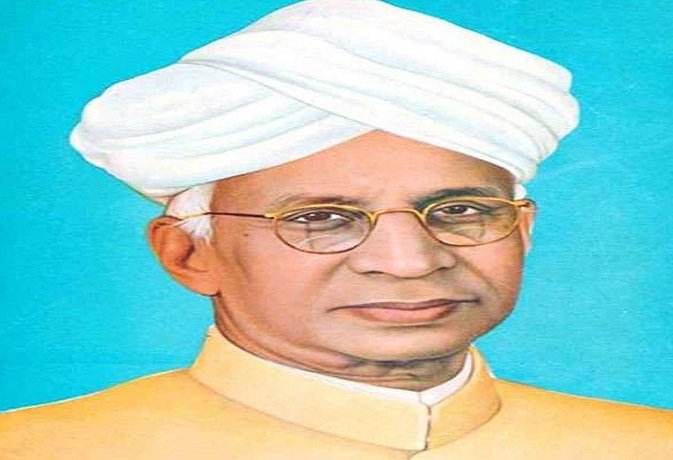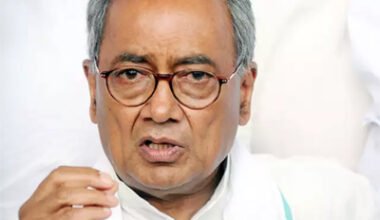Dr. Sarvepalli Radhakrishnan Biography: Full Name, Age, Education, Career, A Philosopher, Educator, Statesman.
Early Life and Background:
Dr. Sarvepalli Radhakrishnan was born on September 5, 1888, in a small town called Tiruttani, located in Tamil Nadu, India. Tiruttani, known for its religious and cultural significance, provided a serene and spiritually enriched environment that shaped the young Radhakrishnan’s formative years. His family belonged to a Telugu-speaking Niyogi Brahmin community, traditionally known for their roles in administration and education.
Radhakrishnan’s father, Sarvepalli Veeraswami, was employed as a revenue officer, a respectable position in the colonial administration of British India. His mother, Sitamma, was a devout woman who instilled in him the values of spirituality and discipline from an early age. Despite the modest means of his family, they prioritized education, believing it to be the key to a better future. This belief would become a cornerstone of Radhakrishnan’s life and philosophy.
Education and Early Influences:
Radhakrishnan’s early education began in Tiruttani and later in the nearby town of Tirupati. He was a bright student, showing an early aptitude for learning and an insatiable curiosity about the world around him. His formal education continued at the Hermannsburg Evangelical Lutheran Mission School in Tirupati, where he excelled academically.
At the age of 17, Radhakrishnan enrolled at Madras Christian College (MCC), one of the most prestigious institutions of higher learning in South India. This period of his life was particularly formative. At MCC, he was exposed to a broad range of subjects, but it was philosophy that captivated his interest the most. The intellectual environment of the college, combined with the influence of his professors, sparked his deep interest in the subject.
Radhakrishnan’s academic journey at MCC culminated in a bachelor’s degree in Philosophy. His thesis for the degree, which explored the ethical and metaphysical elements of the works of Friedrich Nietzsche, showcased his ability to engage deeply with complex philosophical ideas. This early work laid the foundation for his future career as a philosopher and academic.
Mastery in Indian Philosophy:
After completing his undergraduate studies, Radhakrishnan pursued a master’s degree in Philosophy at MCC. It was during this time that he delved into the rich traditions of Indian philosophy, particularly the Vedanta school of thought. The Vedanta philosophy, rooted in the teachings of the Upanishads, the Brahma Sutras, and the Bhagavad Gita, provided Radhakrishnan with a framework for understanding the complexities of human existence, spirituality, and ethics.
Radhakrishnan’s deep understanding of Indian philosophy was not just academic. It was personal and experiential. He believed that philosophy was not merely an intellectual exercise but a way of life. His writings and teachings reflect this belief, as he consistently emphasized the practical application of philosophical principles in everyday life.
Academic Career and Contributions:
Dr. Radhakrishnan’s academic career began in earnest when he was appointed as an Assistant Professor of Philosophy at Madras Presidency College in 1909, at the young age of 21. His exceptional ability to articulate complex ideas in a clear and engaging manner quickly earned him the admiration of both his students and his peers. He was known for his ability to bridge the gap between Eastern and Western philosophical traditions, making the former accessible to a global audience.
In 1918, Radhakrishnan was appointed to the King George V Chair of Mental and Moral Science at the University of Calcutta, a position he held until 1921. During this period, he also represented the University of Calcutta at the Congress of Universities in London. His participation in this international event marked the beginning of his global influence as a philosopher and scholar.
Radhakrishnan’s academic career continued to flourish, and he was appointed as the Vice-Chancellor of Andhra University in 1931. His tenure at Andhra University was marked by significant contributions to the academic and cultural life of the institution. He was instrumental in establishing the university’s philosophy department, which became a center of excellence under his leadership.
In 1936, Radhakrishnan was appointed as the Spalding Professor of Eastern Religions and Ethics at the University of Oxford, one of the most prestigious academic positions in the world. This appointment was a testament to his standing as a leading philosopher and scholar of his time. During his tenure at Oxford, Radhakrishnan delivered a series of lectures on Indian philosophy, which were later published as the seminal work “Eastern Religions and Western Thought.” This book, along with his earlier works, played a crucial role in introducing Indian philosophy to the Western world and establishing it as a legitimate field of academic inquiry.
Philosophical Works and Ideas:
Dr. Radhakrishnan’s contributions to philosophy are vast and varied. His works encompass a wide range of topics, including metaphysics, ethics, religion, and education. However, his most significant contributions lie in the field of comparative philosophy, where he sought to bridge the gap between Eastern and Western thought.
One of Radhakrishnan’s most influential works is “Indian Philosophy,” a two-volume treatise that provides a comprehensive overview of the major schools of Indian philosophical thought. In this work, Radhakrishnan argues that Indian philosophy, far from being a mere set of speculative ideas, is a profound and rigorous system of thought that has much to offer to the world. He emphasizes the spiritual and practical dimensions of Indian philosophy, which he believed could contribute to solving the moral and existential crises facing humanity.
Radhakrishnan’s other major works include “The Philosophy of the Upanishads,” “The Hindu View of Life,” and “Religion and Society.” In these works, he explores the ethical, metaphysical, and religious aspects of Indian thought, arguing for a synthesis of Eastern and Western philosophies. He believed that such a synthesis was essential for the development of a truly global philosophy that could address the challenges of the modern world.
Central to Radhakrishnan’s philosophy is the concept of “integral experience,” which he defines as the harmonious integration of reason, emotion, and intuition. He argues that true knowledge can only be attained through the synthesis of these three aspects of human experience. This idea is closely related to the Vedantic concept of “Brahman,” the ultimate reality that transcends all dualities and oppositions. Radhakrishnan’s philosophy, therefore, is not just an intellectual exercise but a path to spiritual realization and self-transformation.
Diplomatic Career:
In addition to his academic achievements, Dr. Radhakrishnan was also a distinguished diplomat and statesman. His entry into the world of diplomacy was marked by his appointment as India’s Ambassador to the Soviet Union in 1949. This was a crucial period in the history of India, as the country was navigating its newly acquired independence and establishing itself on the global stage.
Radhakrishnan’s tenure as Ambassador to the Soviet Union was marked by his efforts to strengthen Indo-Soviet relations. His deep understanding of both Indian and Western thought, combined with his diplomatic skills, enabled him to engage effectively with the Soviet leadership. He was instrumental in fostering a sense of mutual respect and understanding between the two nations, which laid the groundwork for a strong and enduring bilateral relationship.
Radhakrishnan’s diplomatic career also included his role as a delegate to UNESCO, where he represented India at various international conferences. His contributions to the global dialogue on education, culture, and philosophy were widely recognized, and he became a respected voice on the international stage.
Vice-Presidency and Presidency of India:
Dr. Radhakrishnan’s transition from academia and diplomacy to politics was marked by his election as the Vice President of India in 1952. As Vice President, he served as the ex-officio Chairman of the Rajya Sabha, the upper house of India’s Parliament. His tenure as Vice President was characterized by his commitment to upholding the values of democracy, secularism, and education.
In 1962, Radhakrishnan was elected as the second President of India, succeeding Dr. Rajendra Prasad. His presidency came at a time of significant challenges for the newly independent nation. India was grappling with issues such as poverty, illiteracy, and political instability, and Radhakrishnan’s leadership provided a stabilizing influence.
As President, Radhakrishnan was known for his moral integrity, intellectual rigor, and deep commitment to the welfare of the people. He believed that the role of the President was not just ceremonial but also moral and spiritual. He saw himself as the guardian of the nation’s conscience, and he used his position to promote the values of justice, equality, and human dignity.
During his presidency, Radhakrishnan continued to advocate for the importance of education and the role of teachers in shaping the future of the nation. He believed that education was the key to solving the many challenges facing India, and he consistently emphasized the need for a strong and well-rounded education system. In recognition of his contributions to education, his birthday, September 5, is celebrated as Teachers’ Day in India, a tradition that continues to this day.
Legacy and Impact on Education:
Dr. Radhakrishnan’s legacy is most profoundly felt in the field of education. His belief in the transformative power of education and the role of teachers in shaping society has left an indelible mark on India’s educational system. He was a strong advocate for the idea that education should not just impart knowledge but also build character and inculcate values.
Radhakrishnan’s vision for education was rooted in the ancient Indian tradition of “Gurukul,” where education was not just about academic learning but also about moral and spiritual development. He believed that education should be holistic, integrating intellectual, emotional, and spiritual growth. This vision has influenced generations of educators and policymakers in India and beyond.
In addition to his contributions to education in India, Radhakrishnan’s work has had a significant impact on the global understanding of Indian philosophy. His efforts to bridge the gap between Eastern and Western thought have opened up new avenues for cross-cultural dialogue and understanding. His writings have been translated into numerous languages, and his ideas continue to be studied and respected by scholars around the world.
Radhakrishnan’s Contributions to Comparative Philosophy:
One of Dr. Radhakrishnan’s most significant contributions to philosophy is his work in comparative philosophy. He was one of the first Indian philosophers to engage deeply with Western philosophical traditions and to articulate a vision of philosophy that was truly global in scope.
Radhakrishnan believed that philosophy should not be confined to any one tradition or culture. Instead, he argued that the true task of philosophy was to synthesize the insights of different traditions to arrive at a more comprehensive understanding of reality. This approach is evident in his comparative studies of Indian and Western philosophies, where he sought to highlight the commonalities and differences between the two.
In his work “Eastern Religions and Western Thought,” Radhakrishnan explores the dialogue between Eastern and Western philosophies, arguing that both traditions have much to learn from each other. He believed that the spiritual insights of Eastern philosophy could complement the rational and scientific approach of Western philosophy, leading to a more balanced and holistic understanding of the world.
Radhakrishnan’s comparative philosophy has had a lasting impact on the field, inspiring subsequent generations of philosophers to explore the intersections of different philosophical traditions. His work has also contributed to the global recognition of Indian philosophy as a rich and sophisticated system of thought, worthy of study alongside the great philosophical traditions of the West.
Awards and Recognition:
Dr. Radhakrishnan’s contributions to philosophy, education, and public life have been widely recognized both in India and internationally. In 1954, he was awarded the Bharat Ratna, India’s highest civilian honor, in recognition of his outstanding service to the nation. The award was a testament to his immense contributions to the fields of philosophy and education, as well as his role as a statesman and leader.
In addition to the Bharat Ratna, Radhakrishnan received numerous other awards and honors throughout his life. These include honorary doctorates from universities around the world, including Oxford, Cambridge, and Harvard. He was also made a Knight of the British Empire in 1931, although he later renounced the title as a protest against British colonial rule in India.
Radhakrishnan’s legacy continues to be celebrated in various ways. His birthday, September 5, is observed as Teachers’ Day in India, a day dedicated to honoring the contributions of teachers to society. Educational institutions across the country hold special events and ceremonies on this day, recognizing the critical role that teachers play in shaping the future of the nation.
Final Years and Legacy:
After completing his term as President of India in 1967, Dr. Radhakrishnan retired from public life. However, he continued to be an influential figure, respected for his wisdom, integrity, and contributions to the nation. His final years were spent in quiet reflection, surrounded by his family and close friends.
Dr. Radhakrishnan passed away on April 17, 1975, leaving behind a legacy that continues to inspire and guide generations of students, scholars, and leaders. His contributions to philosophy, education, and public life have had a lasting impact on India and the world. His vision of a just, ethical, and enlightened society remains as relevant today as it was during his lifetime.
Radhakrishnan’s life and work serve as a reminder of the importance of intellectual curiosity, moral integrity, and a commitment to the common good. His belief in the power of education to transform lives and societies continues to resonate with educators and students around the world. As India and the world continue to face new challenges and opportunities, Dr. Radhakrishnan’s legacy provides a guiding light for those who seek to build a more just and compassionate world.
Conclusion:
Dr. Sarvepalli Radhakrishnan was more than just a philosopher, educator, and statesman. He was a visionary who believed in the transformative power of education and the ability of philosophy to bridge cultural divides. His contributions to the fields of education and philosophy have left an indelible mark on the world, and his legacy continues to inspire generations of thinkers and leaders.
Radhakrishnan’s life is a testament to the importance of intellectual curiosity, moral integrity, and a deep commitment to the welfare of humanity. His work continues to be studied and celebrated around the world, and his ideas remain as relevant today as they were during his lifetime. As we look to the future, Dr. Radhakrishnan’s legacy serves as a reminder of the power of knowledge, compassion, and ethical leadership in building a better world for all.







